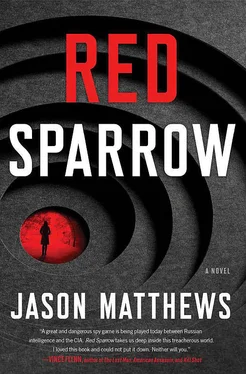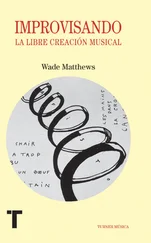She knew enough to follow her instincts, to swallow the bile in her throat. She smiled at this elemental lizard. “Dimitri, this is magnificent, I cannot possibly accept such a gift,” she said. “It’s too generous.”
“Of course you can,” Ustinov said, struggling to be charming. “You are the most beautiful woman I have ever met, and you being here is the most wonderful gift I could ever receive.” He took a sip of champagne and imagined that little black dress in a discarded heap in the corner of his bedroom. “I am very fond of you already,” said Ustinov.
Dominika willed herself not to laugh at him, even as she felt a delicious iciness run up her back and down her arms. This derevenshchina, this rube, had as much sophistication as a provincial bully-boy enforcer, which was exactly what he had been years before. But Lord, he was wealthy now. During the week of preparation, Dominika had been told a few facts about Ustinov: Yachts. Villas. Penthouse apartments. Oil and mineral holdings around the world. A private security army made up of well-paid mercenaries. Three private jets.
=====
Dominika was the only child of Nina and Vassily Egorov. Nina had been concertmaster in the Moscow State Symphony, a rising virtuoso who had studied with Klimov and had such massive potential that she was allocated Guarneri’s magnificent 1741 Kochanski del Gesù by the Glinka State Central Museum of Music and Culture. Fifteen years ago her anticipated promotion to the Russian National Symphony Orchestra was denied her when Prokhor Belenko, a toad-eating violinist of inferior talent—but married to the daughter of a Politburo member—demanded that he be promoted, and was given the position. Everyone knew what had happened, but no one said a thing.
Along with her brilliance in playing the red-varnished skripka, Nina Egorova was known for her fiery disposition, including a simmering temper that exploded whenever she had seen enough. Before the amused eyes of eighty fellow orchestra members, Nina had walloped Belenko above the right ear with his own music stand during his last rehearsal with the State Symphony. Nina was unrepentant. She was also a woman in the then–Soviet Union. They took away the Guarneri. She refused to play a lesser instrument. They moved her from the first to the third seat in strings. She sent them to hell. Administrative leave morphed into dismissal when the Ministry of Culture called the symphony director and her career was over. Now, years later, the elegant neck had bent, the strong hands had curled, the dark hair was gray and in a bun.
Dominika’s father was the famous academician Professor Vassily Egorov, Senior Professor of History at Moscow University. He was one of the most respected and influential figures in Russian letters, with the rank of Meritorious Professor. His gold-and-blue Order of St. Andrew hung framed on the wall; the claret bowknot he wore every day on his lapel was the Medal Pushkina, the Pushkin Medal for achievement in literature and education. Ironically, Vasya Egorov didn’t look distinguished or influential. He was short and slight, with thinning hair combed carefully across his head.
Unlike his wife, Vassily Egorov had survived the Soviet years by avoiding politics, allegiances, and controversy. Cocooned in the university, he succeeded chiefly by carefully cultivating a persona of studious fair-mindedness, discretion, and loyalty. What no one knew was that Meritorious Comrade Professor Vassily Egorov maintained a secret, separate soul, the conscience of a totally different being, in which he harbored a moral thinker’s revulsion for the Soviet. Like all Russians, he had lost family in the 1930s and 1940s to Stalin, resisting the Germans, the purges, the katorga . But more than that. He rejected the imbalance and illogic of the Soviet system, he despised the top-heavy favoritism of the cheloveki, the insiders’ sloth and self-indulgence that crushed the human spirit and had robbed Russians of their lives, their country, their patrimony. It was an apostasy shared only with Nina.
All Russians harbor secret thoughts, they are accustomed to it. So it was with Vassily and Nina, who hid their revulsion at how modern Russia had not changed. Even as Dominika grew older and could begin to understand, Vassily dared not speak to her of their feelings. Both parents yearned to give her a clear vision of the world, to let her see the truth for herself. If they could not expose Russia’s hellish evolution—from Bolshevik rage to Soviet rot and now, even after glasnost, into the Federation’s parasitic greed—Vassily at least resolved to instill in Dominika the real majesty of Russia.
The spacious three-room apartment (after Nina’s dismissal they were permitted to keep it, thanks only to the continued position and prestige of Vassily) was filled with books, music, art, and conversation in three different languages. Her parents noticed, when Dominika turned five, that the little girl had a prodigious memory. She could recite lines from Pushkin, identify the concertos of Tchaikovsky. And when music was played, Dominika would dance barefoot around the Oriental carpet in the living room, perfectly in time with the notes, twirling and jumping, perfectly in balance, her eyes gleaming, her hands flashing. Vassily and Nina looked at each other, and her mother asked Dominika how she had learned all this. “I follow the colors,” said the little girl.
“What do you mean, ‘the colors’?” asked her mother. Dominika gravely explained that when the music played, or when her father read aloud to her, colors would fill the room. Different colors, some bright, some dark, sometimes they “jumped in the air” and all Dominika had to do was follow them. It was how she could remember so much. When she danced, she leapt over bars of bright blue, followed shimmering spots of red on the floor. The parents looked at each other again.
“I like red and blue and purple,” said Dominika. “When Batushka reads, or when Mamulya plays, they are beautiful.”
“And when Mama is cross with you?” asked Vassily.
“Yellow, I don’t like the yellow,” said the little girl, turning the pages of a book. “And the black cloud. I do not like that.”
Vassily asked a colleague from the Faculty of Psychology about the colors. “I have read about a similar condition,” said the colleague. “Sensing letters as colors. It’s quite interesting. Why don’t you bring her by one afternoon?”
Vassily waited in his office while his professor friend sat with Dominika in a nearby classroom. One hour stretched to three. They came back, little Dominika happy and distracted, the professor pensive. “What?” asked Vassily, looking sideways at his daughter.
“I could sit with her for days,” said the professor, packing his pipe. “Your little girl shows the attributes of a synesthete. Someone who perceives sounds, or letters, or numbers as colors. Fascinating.” Vassily looked at Dominika again. She was now happily coloring at her father’s desk.
“My God,” said Vassily. “Is it an illness, is it insanity?”
“Illness, burden, curse, who can say?” He stuffed his pipe. “On the other hand, Vasya, perhaps she is odarennyi, gifted.” Vassily, the brilliant man of letters, was at a loss. “There’s something else,” said the professor, looking over at Dominika, her head bent over her drawing. “Her synesthesia appears to extend to human reactions. Not only words or sounds, she also sees emotional content as colors. She spoke to me about what sounds like halos of color around people’s heads and shoulders.” Vassily stared at his friend. “Perhaps she will develop into something of a savant in matters of human intentions.
“Of course, there is the prodigious memory. She flawlessly repeated twenty-five digits back to me several times. It is not uncommon in these cases,” continued the professor. “But you already have seen that.” Vassily nodded. “And another thing, not so common. Your little girl is prone to buistvo, define it as you like, temper, mischief, a short fuse. She swept my papers to the floor when she could not solve a puzzle. Something she will have to control later in life, I would imagine.”
Читать дальше












